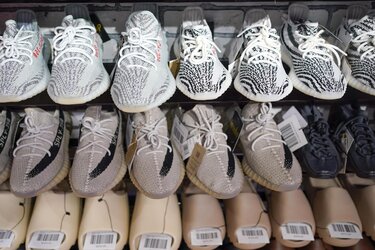Adidas to release second batch of Yeezy sneakers after breakup with Ye
Associated Press (archive.ph)
By David McHugh
2023-07-28 15:43:18GMT

FILE - Yeezy shoes made by Adidas are displayed at Laced Up, a sneaker resale store, in Paramus, N.J., on Oct. 25, 2022. (AP Photo/Seth Wenig, File)
FRANKFURT, Germany (AP) — Adidas said Friday that it is releasing a second batch of high-end Yeezy sneakers after cutting ties with rapper Ye, formerly known as Kanye West, as the German sportswear brand seeks to unload the unsold shoes while donating to groups fighting antisemitism.
The online sale, to start Wednesday through Adidas smartphone apps and its website, follows an earlier set of sales in May. Models that will be available include the Yeezy Boost 350 V2, 500, and 700 as well as the Yeezy Slide and Foam RNR.
The company cut ties with Ye in October after he made antisemitic and other offensive remarks online and in interviews. That left Adidas holding 1.2 billion euros ($1.3 billion) worth of unsold Yeezys and searching for a responsible way to dispose of them.
Adidas CEO Bjørn Gulden said in May that selling the popular sneakers and donating some of the profits was the best solution to deal with the unsold inventory and make a difference. He said the company spoke with nongovernmental organizations and groups that were harmed by Ye’s comments and actions.
Part of the profits from the sales of the Yeezy shoes will go to the Anti-Defamation League and the Philonise & Keeta Floyd Institute for Social Change, run by social justice advocate Philonise Floyd, the brother of George Floyd.
Shoes sold directly by Adidas in North America will include blue square pins established by Robert Kraft’s Foundation to Combat Anti-Semitism as a symbol of solidarity in rejecting antisemitism, the company said.
The Anti-Defamation League calls the sale “a thoughtful and caring resolution” for the unsold merchandise and that “any attempt to turn the consequences of (Ye’s) actions into something that ultimately benefits society and the people he has hurt is most welcome.”
Adidas declined to give details on numbers of shoes that would be released for sale and how much of the proceeds would be donated. Asked if Ye would receive royalties from the sales, the company would only say that “we will honor our contractual obligations and enforce our rights but will not share any more details.”
The company said Monday that the first sale of Yeezy shoes helped its preliminary second-quarter financial results and contributed to it raising its outlook for the year — from a high single-digit decline in revenue to a mid-single digit decline.
That would still amount to an operating loss of 450 million euros (more than $494 million) this year, instead of a loss of 700 million euros.
Adidas, which reports its earnings for the first half of the year on Thursday, said it expected future Yeezy sales to further boost its results.
Associated Press (archive.ph)
By David McHugh
2023-07-28 15:43:18GMT

FILE - Yeezy shoes made by Adidas are displayed at Laced Up, a sneaker resale store, in Paramus, N.J., on Oct. 25, 2022. (AP Photo/Seth Wenig, File)
FRANKFURT, Germany (AP) — Adidas said Friday that it is releasing a second batch of high-end Yeezy sneakers after cutting ties with rapper Ye, formerly known as Kanye West, as the German sportswear brand seeks to unload the unsold shoes while donating to groups fighting antisemitism.
The online sale, to start Wednesday through Adidas smartphone apps and its website, follows an earlier set of sales in May. Models that will be available include the Yeezy Boost 350 V2, 500, and 700 as well as the Yeezy Slide and Foam RNR.
The company cut ties with Ye in October after he made antisemitic and other offensive remarks online and in interviews. That left Adidas holding 1.2 billion euros ($1.3 billion) worth of unsold Yeezys and searching for a responsible way to dispose of them.
Adidas CEO Bjørn Gulden said in May that selling the popular sneakers and donating some of the profits was the best solution to deal with the unsold inventory and make a difference. He said the company spoke with nongovernmental organizations and groups that were harmed by Ye’s comments and actions.
Part of the profits from the sales of the Yeezy shoes will go to the Anti-Defamation League and the Philonise & Keeta Floyd Institute for Social Change, run by social justice advocate Philonise Floyd, the brother of George Floyd.
Shoes sold directly by Adidas in North America will include blue square pins established by Robert Kraft’s Foundation to Combat Anti-Semitism as a symbol of solidarity in rejecting antisemitism, the company said.
The Anti-Defamation League calls the sale “a thoughtful and caring resolution” for the unsold merchandise and that “any attempt to turn the consequences of (Ye’s) actions into something that ultimately benefits society and the people he has hurt is most welcome.”
Adidas declined to give details on numbers of shoes that would be released for sale and how much of the proceeds would be donated. Asked if Ye would receive royalties from the sales, the company would only say that “we will honor our contractual obligations and enforce our rights but will not share any more details.”
The company said Monday that the first sale of Yeezy shoes helped its preliminary second-quarter financial results and contributed to it raising its outlook for the year — from a high single-digit decline in revenue to a mid-single digit decline.
That would still amount to an operating loss of 450 million euros (more than $494 million) this year, instead of a loss of 700 million euros.
Adidas, which reports its earnings for the first half of the year on Thursday, said it expected future Yeezy sales to further boost its results.







